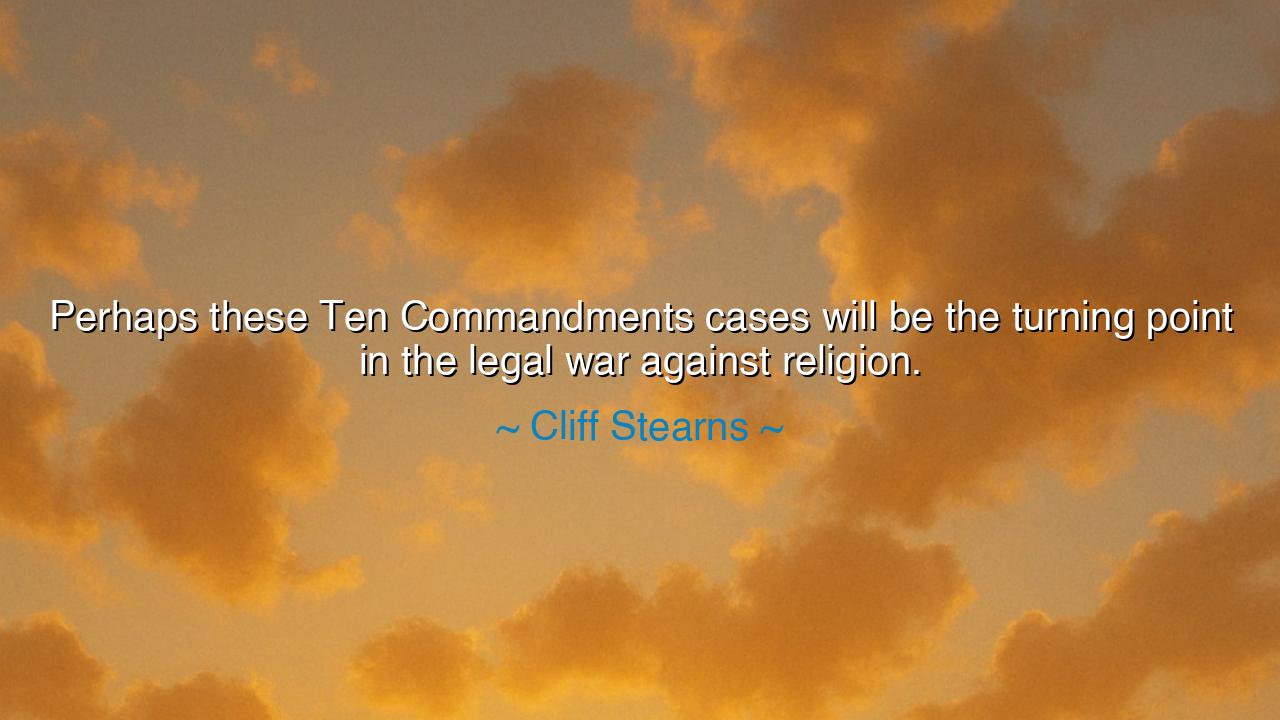
Perhaps these Ten Commandments cases will be the turning point in
Perhaps these Ten Commandments cases will be the turning point in the legal war against religion.






Hear the voice of Cliff Stearns, who spoke in the midst of America’s struggles over faith and law: “Perhaps these Ten Commandments cases will be the turning point in the legal war against religion.” These words carry the weight of sorrow and resistance, the lament of one who perceived the sacred under siege in the courts of men. It is not a quiet observation but a cry of battle, a warning that the pillars of faith, once woven deeply into the nation’s fabric, might be eroded under the relentless tide of legal challenges.
The meaning of this quote lies in the tension between religion and law, between what is ancient and divine and what is modern and secular. The Ten Commandments, long revered as moral foundation, had become the subject of fierce trials and disputes in America’s courts. Where once their presence in courthouses and public squares was taken for granted, lawsuits now argued they violated the constitutional separation of church and state. To Stearns, these contests were not mere cases of stone tablets and monuments, but symbols of a broader legal war against religion, a struggle over whether faith would retain its place in public life or be confined to private hearts alone.
The origin of these words rests in the early twenty-first century, when the U.S. Supreme Court weighed cases involving displays of the Ten Commandments in public buildings—such as in Kentucky courthouses and on the Texas State Capitol grounds. Some monuments were allowed to stand, while others were ordered removed, revealing the fractured and uncertain line the law tried to walk between history and neutrality. To many, these rulings represented balance. To Stearns and others, they were evidence of an encroaching effort to strip religion from the public square. Thus, his words were a call to vigilance, a declaration that these cases marked not the end, but a decisive turning point in the struggle.
History offers many echoes of this conflict. Recall the reign of the Roman Empire, when the early Christians were forbidden to display their faith openly. To the rulers, religion was to be subordinated to the state; to the faithful, obedience to God came before the decrees of Caesar. Their refusal to hide or abandon their beliefs became the seed of a faith that outlasted the empire itself. In every age, the battle over whether the sacred may dwell openly in the public realm or must be hidden in the shadows has defined the destiny of nations.
The lesson here is not only about religion, but about the balance of liberty. A people must decide whether freedom means the silencing of faith in public life, or whether true freedom means allowing all voices, sacred and secular alike, to speak and be heard. To silence faith out of fear of dominance is to risk creating another kind of tyranny—the tyranny of emptiness, where no higher moral vision guides the people. To elevate one faith above all others is likewise dangerous, for it turns liberty into dominion. Stearns’ words cry out that this struggle is not abstract, but vital to the soul of a nation.
What then must we do? As citizens, we must guard against extremes. Defend the rights of believers to speak and display their faith, but also honor the rights of those who believe differently, or not at all. Teach children that the Ten Commandments, whether they hold them as divine or symbolic, are part of humanity’s long moral heritage. Seek understanding in law that protects both freedom of religion and freedom from compulsion in religion. For only in this balance can liberty endure.
Thus, remember the words of Cliff Stearns: “Perhaps these Ten Commandments cases will be the turning point in the legal war against religion.” Take them as both warning and summons, for every generation must decide how faith and law shall dwell together. Let the lesson be this: that liberty is not preserved by banishing the sacred, nor by enthroning it above all else, but by weaving a society where faith and freedom walk side by side. In this lies the hope of nations that seek both justice and the guidance of the eternal.






AAdministratorAdministrator
Welcome, honored guests. Please leave a comment, we will respond soon